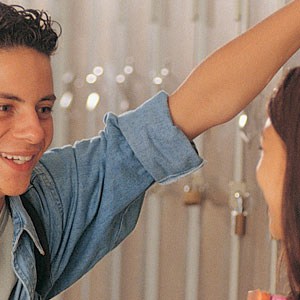
Dating, Part 2
Dating is usually considered one of the benefits of being a teenager. Today, Dennis Rainey taps into the thoughts of a panel of young adults about why teens should or shouldn’t date.
Show Notes
About the Host
About the Guest
-
Dating is usually considered one of the benefits of being a teenager. Today, Dennis Rainey taps into the thoughts of a panel of young adults about why teens should or shouldn’t date.
-
Dave and Ann Wilson
Dave and Ann Wilson are hosts of FamilyLife Today®, FamilyLife’s nationally-syndicated radio program. Dave and Ann have been married for more than 38 years and have spent the last 33 teaching and mentoring couples and parents across the country. They have been featured speakers at FamilyLife’s Weekend to Remember® marriage getaway since 1993 and have also hosted their own marriage conferences across the country. Cofounders of Kensington Church—a national, multicampus church that hosts more than 14,000 visitors every weekend—the Wilsons are the creative force behind DVD teaching series Rock Your Marriage and The Survival Guide To Parenting, as well as authors of the recently released book Vertical Marriage (Zondervan, 2019). Dave is a graduate of the International School of Theology, where he received a Master of Divinity degree. A Ball State University Hall of Fame quarterback, Dave served the Detroit Lions as chaplain for 33 years. Ann attended the University of Kentucky. She has been active alongside Dave in ministry as a speaker, writer, small-group leader, and mentor to countless wives of professional athletes. The Wilsons live in the Detroit area. They have three grown sons, CJ, Austin, and Cody, three daughters-in-law, and a growing number of grandchildren.
-

Dennis Rainey
Dennis Rainey cofounded FamilyLife®, a ministry of Cru®. Since the organization began in 1976 through 2017, Dennis’ leadership enabled FamilyLife to grow into a dynamic and vital ministry in more than 109 countries around the world helping families discover the joy God intended for their relationships with God, spouse, and kids. Dennis has authored or co-authored more than 35 books, including best-selling Moments Together for Couples and Staying Close and has received two Golden Medallion...more
Various
FamilyLife Today features marriage and family experts who have devoted their lives bringing biblical principles to people in ways that positively change their lives. With each program, we are continually reminded that people throughout the world are receptive to the messages of love and hope offered by our radio guests.
Dating is usually considered one of the benefits of being a teenager.
Bob: Dating, or going out, is a big deal in junior high and high school these days. One reason why is because according to teenagers, well, everybody seems to be doing it.
Girl: I guess it's just like, I mean, everybody is going out; everybody has got a boyfriend; everybody has got a girlfriend. It's, like, okay, all these boys like you, but you're not going out with them. It's, like, why? But it's, like, I know my priorities for dating, and I don't want to do it right now. So I get this peer pressure – it's just, like, no – you just have to say no.
Bob: This is FamilyLife Today for Thursday, July 30th. Our host is the president of FamilyLife, Dennis Rainey, and I'm Bob Lepine. Has your teenager developed convictions in the area of dating and, as a parent, do you know what your convictions are?
And welcome to FamilyLife Today, thanks for joining us on the Thursday edition. The whole guy/girl thing …
Dennis: … yeah, yeah, what about it?
Bob: It's a …
Dennis: … it's what?
Bob: It's a field that is loaded with landmines, isn’t it? You know what I'm saying?
Dennis: I'm telling you, I'll never forget when Samuel finally got noticed by the young ladies at school. I mean, the phone lines lit up. It was like the boy had won the lottery.
Bob: They were calling him?
Dennis: Oh, a dozen.
Bob: You know, when I was growing up, girls didn't call boys. That's changed, huh?
Dennis: Oh – when a young man comes of age, and if he's reasonably handsome, there are groups of young ladies who can be quite aggressive. That's an understatement, by the way.
Bob: And when that happens, all of a sudden, the chemical reaction inside a girl and inside a boy – well, it can get pretty dicey, and that's one of the reasons this week we're coming to parents and saying, "Be aware of what's ahead, help your preteen be aware of what's around the corner, and then have a strategy for dealing with these issues in advance of them showing up on the radar screen."
Dennis: Actually, the word I would use rather than "be aware" is "understand," and there's a biblical word that talks about understanding the times, for they are evil, that is found over in Ephesians, chapter 5 – being wise about the days. Parents today need to be very, very wise in understanding what's happening with preteens and teenagers. Don't wait until your child is in junior high to address the issues about the opposite sex.
Bob: You and Barbara wrote a book for parents called Parenting Today's Adolescent, that was really designed to be read by parents of preteens so that they could develop a biblical game plan for navigating, negotiating, the teenage years. But then, together with your son, Samuel, and your daughter, Rebecca, the four of you wrote a book called, So You're About to be a Teenager, that is designed not just for parents but really it's designed for the preteen to read, right?
Dennis: It is. I hope when you, as a listener, think of FamilyLife Today and our ministry here, you think of us as a giant toolbox that FamilyLife Today, at its website, FamilyLife Today.com, through our conferences, our radio program, our resources, tapes, CDs, all the things we're producing, we produce for you to help you build your family, to equip you and to assist you in connecting your heart to your spouse's heart; to connect you, as a father or mother, to your child's heart.
There is no issue today, Bob, any more important than connecting a parent's heart to their preteen before they hit the rapids, the tumultuous waters that can capsize an entire family. We want to give you some tools, and that's why we wrote this book, So You're About to be a Teenager, written directly to your 11- or 12-year-old, possibly a 13-year-old or a 10-year-old, but it's designed to help you, as a parent, put a tool in your child's life that's going to help him or her better understand what you are trying to teach him.
Bob: You've been suggesting all week that in addition to putting the tool in your child's hand, you grease his palm a little bit, you know, you slide across some jack, some change, some money here, right?
Dennis: Bob, you referred to this earlier in the week as a bribe.
Bob: Yeah, well.
Dennis: Today you're talking about greasing palms. This sounds like the Mafia. We're actually trying to incentivize …
Bob: … yeah, there we go …
Dennis: … we're trying to motivate, we're trying to put a carrot out in front of our preteen, and I've done this for your son, Jimmy, and I'm about to do it for John. In fact, your kids are costing me a lot of money. But you're actually matching my $5 with $5 of your own and, frankly, folks, I wish, for every single parent listening to our broadcast right now, I could give you the book and $5 to incentivize your child to read this, because I really do believe in the message of this book and the need for a whole generation of young people to be better equipped before they get into the teenage years. You know what? They may read this book, and they may never say another word about it. But the point is, is to get the truth into their hearts and into their minds.
Bob: All week we've been listening to an exchange that took place a number of years ago. We gathered together a whole group of preteens. I think there were about 100 of them that were in an auditorium on a particular evening, and we had four young adults – two young men, two young women – Grant and Andrew were the young men and Katy and your daughter Rebecca, who at the time was still in college. Now she’s out of college and is married but we had all four of these young people we put them on the hot seat and peppered them with a bunch of questions.
Let’s listen together to our conversation with these four young teenagers.
(taped interview)
Bob: Do you remember when you first started to notice girls or guys differently than you had when you were in the fourth grade? Do you remember a time when you looked at a girl, guys – or, ladies, you looked at a guy and went, "He seems different now." Katy, do you remember the first time you started to notice that boys were different than you thought they were?
Katy: I’d say the pressure to date begins in the sixth grade, but I really didn't notice that they were cute or good-looking or anything like that probably until about ninth grade – I'm going to cringe. But, really, like, I never really – I mean, I didn't walk around, "Oh, he's so cute," you know? I didn't just pine away.
Bob: But it was about sixth grade that you wished a boy would like you?
Katy: Yeah, I think it was the idea that was fun. It really wasn't the guy but, yeah, I dated a boy in sixth grade – or I went out, I guess.
Bob: Oh, well, now tell me about this? You went out with a boy – it wasn't Grant was it? It wasn't Grant that you …
Katy: … no, it wasn't Grant, no. It was a boy in sixth grade and, well, let's see, I think it started in fifth grade. We kind of liked each other because we were in the same Sunday school class. We didn't go to elementary school together. He went to a different school, and then …
Bob: … so you would see each other every Sunday at church?
Katy: We'd see each other at church, and it was just a fun, like, "Oh, hi. He thinks I’m cute, I think he's cute." But, you know, that was about it. I mean, it wasn't like – we'd write notes every once in a while, and that was fun. And he got me something for Valentine's Day one year, and it was fun.
Bob: Did he call you?
Katy: He called, like, twice, I think. We didn't talk on the phone very much. It wasn't a very – it wasn't like we sat down, and we're, like, "Okay, we're together now." You know, we just knew we liked each other.
Bob: And how did it end?
Katy: I think – yeah, I remember it ending. It was hard. I think he called me and was, like, you know, I don't think we should go out anymore or whatever, I don't know.
Dennis: He got his training from Grant, huh?
Katy: Yeah, "I don't like you anymore." I don't know, we just kind of ended it, and it really wasn't a huge deal, but I remember I saw him in seventh grade, because he ended up coming to my junior high, and I started wearing glasses that year. He called them bifocals, and they were not bifocals, but it was horrible. He totally made fun of me, and I hated wearing my glasses after that point. You boys can be so cruel.
Bob: When he called you to break up with you, did you cry?
Katy: No.
Bob: You just kind of got off the phone and well, that's over.
Katy: I think I was sad, because it wasn't, like, the talk of the sixth grade. It wasn't, like, a huge deal. It wasn't a big heartbreaker for me. Those came later.
Bob: If a guy says he likes you, and then he comes back and says, "Now I don't like you," doesn't it make you feel like something must have gone wrong with you?
Katy: Yeah, I would feel that. I don't remember what he said when he broke up with me. I don't think he was, like, "I don't like you anymore." I didn't feel like he just thought I was ugly or something.
Bob: And your parents let you do this?
Katy: No, they didn't know.
Bob: Oh, your parents had no idea?
Katy: Because it wasn't – we hadn't talked about that yet. I don't think we even talked about dating yet at that point – going out.
Bob: Do you remember – do you know any of this? Is this all news to you tonight to learn about your daughter and this boy?
Dad: I didn't know she had a steady guy back then, no.
Katy: Oh, well, I told Mom. Mom knows. If you tell Mom – I'm just kidding.
Dennis: How many of you out here under the age of 14 feel the pressure to go out? Hold your hands up. Be honest, come on.
Bob: Do you feel like you're not cool if you don't have a boyfriend or a girlfriend? Is that what it feels like? Or does it just feel like it would be fun to have a boyfriend or a girlfriend? There was probably half the room that raised their room and said they feel a pressure. Does anybody want to talk – what does it feel like?
Girl: I guess it's just, like, I mean, everybody is going out, everybody has got a boyfriend, and everybody has got a girlfriend. It's, like, okay all these boys like you, but you're not going out with them. It's, like, why? But if I know my priorities for dating, and I don't want to do it right now.
So I guess it's more peer pressure. It's just, like, no. You just have to say no. If someone comes up to you and asks you, "Do you want to go out?" It's just kind of like you might like them but you want to stand strong and stand firm for what your priorities are. That's how I feel with it.
Bob: You sound like you've made up your mind about some things. What are your priorities when it comes to going out or guys or dating or that kind of stuff?
Girl: Well, I guess now – I mean, I'm only going in seventh grade, and it's just, like, going out right now is not going to affect me probably later in life. Like, they all said they probably broke up a couple of months later or a year later, and then they never talked, really, or anything like that. It's, like, that didn't affect them later in life. So why do it now, when it's not going to affect you later in life or something.
Dennis: I think the key thing she is really highlighting is that she made up her mind in advance what she was going to do before she faced the issue, and she's becoming a young lady who has convictions. As you face temptations with the opposite sex, if you don't know where you stand, you're going to blow like a feather in the wind. What about you, Andrew? You haven't weighed in on the opposite sex. Did you go out when you were in the sixth grade?
Andrew: I think it was seventh grade when I had my first girlfriend, and I met her at the mall, of all places. I was working at Chick-fil-A, and I was working the register, and she came up and got to talking, and we just started calling each other, and …
Bob: … you met at Chick-fil-A? Did she say, "I'd like a chicken sandwich and here is my phone number" or what?
Andrew: That's how it went.
Bob: Really? She gave you her phone number and said, "Call me."
Andrew: She got her chicken, and then she walked around with a napkin and wrote her number on it and came back later. And so …
Dennis: … and so that struck up a great relationship that …
Andrew: … an awkward relationship, if anything. Our parents took us around to go out, and they took us on all our dates. We were pretty much silent the whole time. We'd just sit there, and we'd watch a movie or something, but …
Bob: … like, with your parents in the movie theater with you?
Andrew: Well, they'd drop us off and wait outside or go shop.
Bob: So in the seventh grade you're with a girl who gave you her phone number at Chick-fil-A watching movies, and your parents aren't there?
Andrew: My parents aren't there, but nothing's happening. So it doesn't matter.
Bob: How did it end?
Andrew: It was only, like, three months long, and she called one day, and she was, like, how's the relationship going? How do you feel? And I just said, "I don't think it's going anywhere. It's pretty pointless, and we should break it off, really." And she asked if we could still be friends, and we were, like, "Yeah", we agreed to be friends, and it ended up that we never talked again.
Bob: Isn't it hard to still be friends after you break up?
Andrew: Yeah, definitely.
Bob: Katy, were you nodding your head there?
Katy: Yes, I remember my first boyfriend, and there was a lot of pressure to go out with him. Like, everybody was kind of in on it. Like, "He likes you," "you need to like him," "everybody has a boyfriend," "you need to have a boyfriend." It only lasted a couple of days.
Bob: I think one of the things …
Rebecca: Wow.
Bob: Oh, a couple of days.
Katy: There's just that pressure to have a boyfriend just to say you did.
Bob: It seems like one of the issues here – it's not about who the girl is or who the guy is, it's just about having a girl or a guy as long as it's somebody. Am I hearing that?
Katy: Yeah.
Bob: Or was it – I mean – they have to meet certain minimum basic requirements – they can't be really ugly or can't be four years younger than you or something like that, but you want – if you have a boyfriend or a girlfriend, are you cooler in the seventh grade than if you don't? The panel is quietly nodding their heads.
Andrew: Yes.
Bob: Thank you.
Dennis: If you had it to do all over again, when would you start dating?
Grant: I'd probably say hold off – probably in college.
Bob: Now wait, you're about to be a freshman in college.
Grant: Yeah.
Bob: Did you follow this advice and hold off?
Grant: No, I didn't.
Bob: So why are you recommending it, if you've just come out of high school, and you're saying, "This is not what I did, but it's what I'd recommend to you."
Grant: You're putting yourself at a great risk for a minimum amount of pleasure when you date.
(end of interview)
Bob: We've been listening to a conversation with a panel of young adults about life in the teenage years. I think my buddy Grant, there, is still working on his convictions a little bit, don't you think? Do you know what I mean? Still trying to get a handle around exactly where he wants things to land. But isn't that what the teenage years are all about? You wrestle with the temptations of today and the convictions of your heart, and sometimes those will pull you right apart as a teenager.
Dennis: They will, and that's why you, as a parent, have to have your own game plan for training your child, guiding your child, and ongoing involvement as they approach the issue of the teenage years and dating.
Then the second thing you, as a parent, need is you need to know what your rules and boundaries are in advance of the issue. If you don't know what age you're going to let them date, then I promise you, they're going to pester you into lowering that age to an unacceptable age.
Bob: And can I say something right here? I have observed some parents who are maybe even more enthusiastic about their children beginning the dating process than the kids are. Parents who, when the kids are 13 and 14 are trying to pair them up and trying to get them together as couples and encouraging them to date. I tell you, I look at those scenarios, and I think do those parents know what they're doing? They're putting too highly flammable substances in the same place and plugging in the plug, you know?
Dennis: No doubt about it. It's not only when they date, but whom should they date, the caliber of person, don't be ashamed to step in there and say, "There's no daughter of mine going out with a guy like that. I mean, if he doesn't have his pants pulled on properly and dressed reasonably, he's not going out with my daughter.”
You need to decide what the acceptable kinds of dates are – double dates, single dates, when are you going to allow that to happen? Telephone use – I think there has to be a limit on the amount of telephone use; internet use with the opposite sex. Here's where you could use a good software package to help you find out what's being communicated between your teenager and teenagers of the opposite sex.
Bob: You think that's okay, huh?
Dennis: I guarantee you, I think it's okay. Now, the reason you do all these things is you're involved in your young person's life to teach them not only about the responsibility that they have in terms of dating and being honorable in that relationship. But also that it's a process from which they're selecting a spouse for a lifetime, and they need to begin to understand what it is they need to look for, and there's three decisions in life that are life-determinative.
Number one – master – who is going to be your master? Is Jesus Christ going to be your master or is self going to be your master. Secondly – mate – your spouse is, I think, humanly speaking, the most important decision you make outside your relationship with Christ.
And then, third, your mission, and your spouse has a great impact on what your mission in life is and what you're going to do as a person. As parents, we're equipping our young people to make all three of those decisions as wisely as they possibly can.
Bob: We've been encouraging our listeners this week to get a copy of the book, So You're About to be a Teenager, and to encourage your young person to read through this book and to begin to connect as parent and child around these issues.
Dennis: What we're talking about there is giving your child $5 or $10 or a trip to their favorite restaurant as a reward for going through this book and, at the end of the book, signing each of the 12 commitments that are at the end of the book. There are 12 life choices at the end of this book that every preteen needs to grapple with before they turn 13. If they make the decision of what they're going to do in advance of these issues, I promise you, the teenage years will be much easier.
Bob: We ought to mention that this book was put together to be used in conjunction with the Passport to Purity resource that so many of our listeners in fact we’ve had tens of thousands who have gotten this resource and used it with a preteen son or daughter.
You get away for a weekend and you listen to these CDs with Dennis and Barbara and you’ve got some projects you do together. You can begin to tackle the issues that we’ve talked about this week so that as a parent you can begin to open the door to some of these issues and have a heart to heart conversation with your preteen son or daughter.
We have information about both the book, So You're About to be a Teenager and the Passport to Purity resource on our web site FamilyLife Today.com. You can go online to find out more or to order any of these resources if you’d like.
You can also read comments from a lot of parents who have used Passport to Purity and hear what their kids had to say about the weekend away with mom or dad.
Again our web site is FamilyLife Today.com. You can also call us for more information at 1-800-FL TODAY. That’s 1-800-358-6329. 1-800 “F” as in Family, “L” as in Life and then the word TODAY. When you get in touch with us someone on the team will let you know more about how you can have the resources you’re looking for sent to you.
I mentioned the comments that we heard from parents and from preteens who have been on a Passport to Purity weekend. We’re always encouraged when we get feedback from FamilyLife Today listeners or folks who have been to our events about how God uses these resources in their marriage or in their family as parents connect with their teens and try to help guide and shape the direction of their lives.
At FamilyLife we exist to provide practical, biblical help for marriages and for families. Our desire is to see every home become a godly home. We are doing all we can to equip moms and dads and husbands and wives with the biblical tools needed to make marriage and family be all that God intends for it to be. You know what we could not do that without folks like you. Folks who pass the word and tell them about FamilyLife Today and invite to tune in and pass along a resource you get from us.
Spread the word about what’s going on here at FamilyLife Today and those of you who help support the ministry financially. We are listener supported and we could not be on this station throughout the year if it were not for folks like you providing financial support to help us pay the bills.
We appreciate your partnership with us in past months. If you are able to make a donation this month we’d like to say thank you by sending you The Five Essentials for a Thriving Marriage card that our team has put together. This is a card that we’ve designed to help couples keep the essentials out in front of you. If you’re not working on building a stronger marriage and focused on the five areas that Dennis and Barbara have identified here you will experience the inevitable drift toward isolation that happens in most relationships.
The Five Essentials for a Thriving Marriage card is our gift to you this month if you’re able to help with a donation of any amount to support the ministry of FamilyLife Today.
You can donate online at FamilyLifeToday.com and when you do that as you’re filling out the donation form there’s a key code box just type the word “thrive” in the box and we’ll send it to you.
Or simply call 1-800-FL TODAY and just mention that you’d like the five essentials card and we’ll send it to you as our way of saying thank you for your support and it’s always an encouragement to us.
Now tomorrow we want to invite you back as we ask our panel of older teens for the best advice they have for the 100 younger teens in the audience on that particular evening. I hope you can be back for that.
I want to thank our engineer today, Keith Lynch, and our entire broadcast production team. On behalf of our host, Dennis Rainey, I'm Bob Lepine. We'll see you back next time for another edition of FamilyLife Today.
FamilyLife Today is a production of FamilyLife of Little Rock, Arkansas.
Help for today. Hope for tomorrow.
We are so happy to provide these transcripts for you. However, there is a cost to transcribe, create, and produce them for our website. If you've benefited from the broadcast transcripts, would you consider donating today to help defray the costs?
Copyright © FamilyLife. All rights reserved.
www.FamilyLife.com




